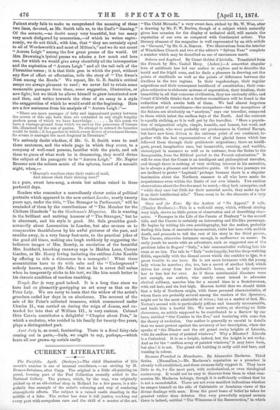Sahara and Lapland. By Count Goblet d'Alviella. Translated from the
French by Mrs. Cashel Hoey. (Asher.)—A somewhat singular- love of antithesis has led our author to explore and to describe the torrid and the frigid zone, and he finds a pleasure in drawing out the points of similitude as well as the points of difference between the dwellers in the two regions. In their vagabondage, their regular migrations and their consequent hardihood of constitution; their com- plete subjection to elaborate systems of superstition, their fatalism, their immobility in all that concerns civilisation, they are curiously alike, and Count d'Alviella thinks that a further resemblance will be found in the extinction which awaits both of them. We had almost forgotten another point of resemblance—the mosquitoes—but the mosquitoes of the Sahara are absolutely an "anodyne," says our traveller, compared to those which infest the endless days of the North. And the contrast, is equally striking, as it is well put by the traveller. "Here a popula- tion of enigmatical origin, simple, humble, and honest, but weak and unintelligent, who wore probably our predecessors in Central Europe, but have now been driven to the extreme point of our continent, to- gether with the last representatives of that glacial fauna which has followed them through their prehistoric migrations; there an intelli- gent, proud, imaginative race, but immovable, cunning, and warlike,. stereotyped in manners as well as in costume, from the Indus to the Senegambia, from the Biblical period to the French colonisation." It will be seen that the Count is an intelligent and philosophical traveller,. and though there is nothing of very striking interest in his narrative, he is always a pleasant and instructive guide. Of hie two journeys we. are inclined to prefer "Lapland,'' perhaps because there is a singular fascination about the Northern summer to all who have made its acquaintance even within the limits of our own islands. Two curious observations about the Swedes must be noted,—they lack enterprise, and "while they care but little for their material needs, they make up for it on their intellectual side." These seem to be the elements of a very fine character.


































 Previous page
Previous page